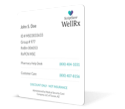Do you need a Folic Acid supplement?
June 6, 2016

Folic acid supplementation has always been regarded as the key to natal wellness. However, recent studies have linked high levels of this vitamin to autism. So this may have you wondering what is a sufficient amount and where can I obtain it? First, you should be aware of the difference between folate and folic acid. Folate is the naturally occurring form of the vitamin which is found in foods such as dark leafy greens and legumes. On the other hand, folic acid is the synthetic form of the vitamin that you will find in over the counter supplements and fortified foods.
The truth about folic acid
There are many sources of folic acid which you may not have thought contained this pertinent vitamin (See Table 1). Depending on your diet, you may be able to obtain the daily requirements of folic acid from everyday foods. The daily requirement for adults is 400 mcg per day, for pregnant women it is 600 mcg per day and for breastfeeding women it is 500 mcg per day.
Folic acid containing foods
| ● Dark leafy greens- spinach (1 cup raw = 110 mcg folate)
● Asparagus- (1 cup raw = 122 mcg folate) ● Broccoli- (½ cup cooked = 50 mcg folate) ● Citrus Fruits- oranges (1 medium = 40 mcg folic acid) ● Strawberries- (8 medium = 80 mcg folate)
|
● Okra- (½ cup cooked = 135 mcg folate)
● Beans-(black, kidney, pinto), ½ cup = 115-145 mcg folate ● Peanuts- (¼ cup dry roasted, unsalted = 166 mcg folate) ● Avocado- (1 cup = 386 mcg folate) ● Banana Pepper- (1 cup raw = 443 mcg folate) ● Salmon- (1 filet = 881 mcg folate) |
Folic acid dietary intake is important because it aids in the development of the brain and spinal cord of the developing infant. Therefore, it is crucial that you are getting the correct amount either from the foods you eat or through supplementation. A recent study by ConsumerLab tested multivitamins and discovered that many vitamins did not match label claims, so you may be getting too much or too little of the desired vitamin. As always, it is important to discuss supplementation with your doctor and also consider blood work to determine your current levels of folic acid prior to adjusting your daily intake.
Although the prevalence of autism is at an all-time high, with careful monitoring of your daily folic acid intake you can avoid getting too much of this vitamin.
References:
- USDA.gov/food-sources
- Wiens D, DeWitt A, Kosar M, et al. Influence of Folic Acid on Neural Connectivity during Dorsal Root Ganglion Neurogenesis. Cells Tissues Organs 2016:1-12.
Do you need to save on your prescription medications?
Visit www.WellRx.com to compare prices on medications at pharmacies near you.
Recommended Articles









